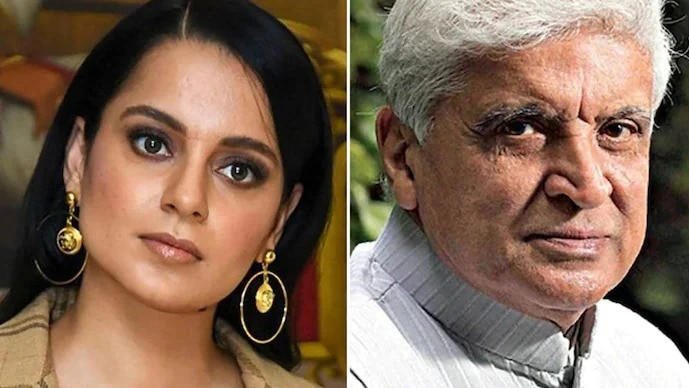Veteran lyricist and poet Javed Akhtar’s defamation case against actress Kangana Ranaut has taken a significant turn, with the case now being transferred to a special court. This development comes after years of legal back-and-forth between the two prominent figures in the Indian entertainment industry. The case, which has garnered considerable media attention, stems from a series of public statements made by Kangana Ranaut that Javed Akhtar claims have tarnished his reputation.
The Origin of the Defamation Case
The legal battle between Javed Akhtar and Kangana Ranaut dates back to November 2020, when Akhtar filed a defamation suit against the actress. The suit was filed after Ranaut made certain allegations during a television interview, where she accused Akhtar of being part of a “Bollywood mafia” and claimed that he had tried to intimidate her into silence about actor Hrithik Roshan, with whom she had a much-publicized dispute.
In the interview, Ranaut alleged that Akhtar had called her to his house and advised her to apologize to Hrithik Roshan, implying that Akhtar was acting on behalf of powerful figures within the industry. She suggested that Akhtar’s actions were an attempt to suppress her voice and her accusations against Roshan, framing it as a part of a larger effort by influential industry insiders to silence dissenting voices. These statements were seen by Akhtar as defamatory, damaging both his reputation and standing in the industry.
Javed Akhtar, a respected figure in Bollywood with a decades-long career, responded by filing a defamation case, asserting that Kangana’s statements were false, malicious, and had caused irreparable damage to his image. In his complaint, Akhtar stated that her remarks had not only tarnished his personal reputation but had also cast aspersions on his credibility within the industry.
Transfer to Special Court
After a prolonged legal process, the defamation case has now been transferred to a special court under the Prevention of Money Laundering Act (PMLA) in Mumbai. This move, ordered by the Mumbai Sessions Court, comes as part of an effort to expedite the trial, which has seen multiple delays since its inception. The transfer to a special court signals the seriousness of the case and the need for a focused and accelerated trial.
The decision to move the case to a special court also underscores the complexity of the matter, which has evolved beyond a straightforward defamation suit. As the case has progressed, it has drawn in wider debates about freedom of speech, the right to dissent, and the culture of power dynamics within Bollywood.
The special court, which typically handles cases under the PMLA, has been vested with the responsibility of ensuring that the defamation trial proceeds efficiently. This development is likely to bring both parties back into the spotlight as the case resumes under a more scrutinized judicial process.
Kangana Ranaut’s Stance
Kangana Ranaut, known for her outspoken nature, has remained defiant throughout the legal proceedings. She has maintained that her comments about Javed Akhtar were truthful and that she was exercising her right to free speech. Ranaut has framed the case as an example of how powerful people within the Bollywood establishment use legal means to suppress voices that challenge the status quo.
The actress has frequently used social media platforms to comment on the case, portraying herself as a victim of the “Bollywood mafia” and claiming that she is being targeted for speaking out against influential figures in the industry. Her supporters argue that she is being silenced for standing up to the entrenched power structures in Bollywood, while her critics accuse her of using sensationalism and controversy to further her own narrative.
Javed Akhtar’s Position
Javed Akhtar, on the other hand, has maintained that the defamation case is not about stifling dissent but about protecting his reputation from baseless allegations. Known for his measured and articulate public persona, Akhtar has repeatedly asserted that Ranaut’s comments were not only false but also damaging to his decades-long career and public image.
Akhtar, a lyricist and screenwriter who has shaped much of Bollywood’s musical and literary landscape, has expressed his disappointment over the controversy. He has pointed out that his contribution to Indian cinema and culture has been built on a reputation for fairness, artistic integrity, and intellectual honesty. For him, the case is about restoring that reputation and ensuring that public figures are held accountable for false and defamatory statements.
The Broader Implications
The Javed Akhtar-Kangana Ranaut defamation case is more than just a personal legal battle. It has become emblematic of the ongoing tensions in Bollywood between those who claim to be outsiders challenging the industry’s established power structures and those who are seen as part of the traditional system.
The transfer of the case to a special court is a significant step forward in the legal proceedings, bringing the case closer to a resolution. With both sides entrenched in their positions, the upcoming hearings will likely continue to captivate public attention, reflecting broader societal debates around free speech, defamation, and the influence of the entertainment industry on public discourse.
As the case moves ahead, it will be watched closely not only for its legal outcomes but also for its potential to influence the ongoing conversation about power, reputation, and accountability in Bollywood.
